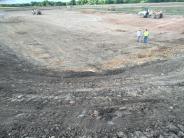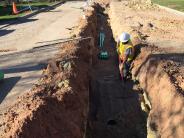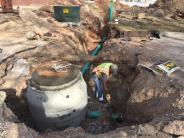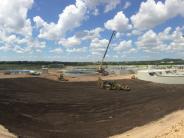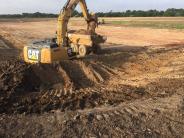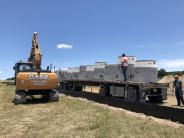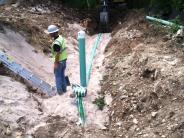-
Top Topics
-
- Contact the City Events and Meetings Agendas and Minutes Calendar Municipal Court GIS Mapping Public Notices
- Online Payments Facility Rental Garage Sales Forms, Permits & Applications Bids and RFPs Ordinances and Resolutions
-
Delaware Springs Golf Course
Job Opportunities
Sign Up for City of Burnet Alerts!
2025 Flood Event Resources & Updates
-
- Government
- Community Information
- Departments
Wastewater Department

The City provides sewer services to the citizens of Burnet. Report any sewer line breaks immediately to the Water/Wastewater Department by calling (512) 756-6093.
Sewer System
The treatment plant has a capacity of 1.7 mgd. The average flow of wastewater treated in 2010 was 0.652 mgd per day, or about 106 gallons per person per day. The City of Burnet treats its customer's wastewater at a treatment plant located south of town. The treatment process consists of an Enhanced Biological Nutrient Removal Facility.
Based on the current flow and receiving stream requirements the Texas Commission on Environmental Quality (TCEQ) required the City to increase the treatment capacity to meet both current and future demands, as well as satisfy increasingly stringent water quality requirements to protect the receiving stream.
The City of Burnet's intent is not to discharge to the receiving stream. However, rain events and effluent storage limitations may require discharging. The Facility is also capable of producing Type I or Type II water for reuse.
The treatment process is a biological process that works similar to our digestive system. Since it is a biological process it cannot tolerate excessive fats, oils, greases or chemicals. Materials that cannot be treated can disrupt the treatment process, and negatively affect effluent water quality.
The City has a Beneficial Land Application Permit to apply digested sludge on hay fields at the WWTP site and has a Reclaimed Water Authorization Permit to reuse the effluent at the onsite hay fields, Delaware Springs Golf Course and other areas permitted by TCEQ.
The collection system consists of approximately 40 miles of piping, 650 manholes, and 13 lift-stations. The City is currently under a Sanitary Sewer and Evaluation Study (SSES) agreement. This agreement will reduce inflow and infiltration (I&I) which creates a negative impact upon the collection system during rain events.
All City operations personnel that are responsible for treating wastewater continuously participate in advanced training and achieve licensing to ensure that water quality and facility operations remain at their best.
Winter Sewer Averaging
Since sewer usage is not metered, the rate for sewer services is based on water usage in December, January and February of the previous year. These three months tend to be the lowest water usage, therefore sewer rates are set based on low water usage.
Click any thumbnail image to view a slideshow

